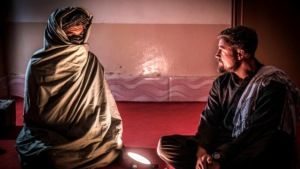News
Face-to-face with a former foe: The Danish veteran who interviewed the Taliban
This article is more than 6 years old.
War correspondent and former soldier go undercover in Afghanistan to try to understand what happened to the war-torn country after the western intervention

Martin Tamm Andersen in talks with the Taliban (photo: DR)
“We did not leave because we fixed the situation in the country, or because we had a military victory,” explained Martin Tamm Andersen, a veteran soldier who served in Afghanistan, to DR. “We just left.”
Like the Afghans in the country, Andersen has not been able to find peace or closure with the country he left behind.
“The war has been nagging me and I have a lot of questions about it. It feels absurd to me that it is still going on eight years later.”
For Andersen, it was an easy decision to join forces with Nagieb Khaja, a Danish journalist and war correspondent, and return to Afghanistan to try to understand what has happened to the war-torn country since the western intervention.
Talks with the Taliban
Together they went undercover in one of the country’s most violent regions, the Helmand Province, where they ended up interviewing a member of the Taliban to obtain a deeper understanding of the war.
“There is something about this war that does not make sense. We did not create a solution for the country. It is devastating and depressing,” lamented Andersen.
“We owe it to each other to continue debating this and to end this violence in a proper way. We cannot allow Afghanistan to continue with its spiral of violence.”
Starting a dialogue
Just last year, Kabul was targeted by 30 terror attacks. According to the UN, a total number of 3,804 civilians were killed in militant attacks in 2018 – which is the highest number of civilians killed since the war broke out in 2001.
Andersen and Khaja, who has been covering the war for years on end, wanted to produce a documentary that revealed another side of what is a complex war.
“I want to show that this war is ultimately about humans beings fighting against each other,” revealed Nagieb.
“And then I want to show that it is possible to create a space where two enemies can start a dialogue.”
Their documentary can be viewed here.










































